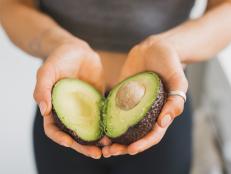What Are Pasture-Raised Eggs?
Our expert breaks down all the labels you'll find on an egg carton these days.

Image courtesy of Vital Farms
The egg aisle isn't what it used to be. What was once a decision between white or brown eggs has become a time-consuming task full of labels and industry jargon. In addition to organic or not, shoppers are sifting through a slew of labels: caged, cage-free, free-range, and, the latest, pasture-raised. This is why we asked an egg expert to cut to the chase about what all these labels mean so you can decide exactly which dozen eggs you should actually be purchasing.
Egg Terminology
Let’s start with the basics. You can find caged, cage-free and free-range on store shelves and here’s a rundown of those terms.
Caged Eggs: About 90% of eggs in the U.S. come from caged hens. The birds are confined to cages for their egg-laying lives and are given 67 square inches each. They eat a corn or soy diet.
Cage-Free Eggs: These birds have more room than caged hens, as they are each provided with less than 1 square foot. They are confined to the barns and eat a diet of corn or soy.
Free-Range Eggs: These hens are allotted less than 2 square feet per hen which is more than caged and cage-free hens, but don’t go outdoors too often. They are usually fed a corn or soy based diet.
So What Is Pasture-Raised?
These hens are allotted at least 108 square feet per hen. They eat a combination of carefully balanced supplemental feed and whatever they can find in the dirt when they go outdoors including grass, worms and bugs. They are able to leave the barns early in the morning and are called back before nightfall.
Vital Farms brought the pasture-raised standards to the U.S. in 2007. According to Matt O’Hayer, founder of Vital Farms (whose favorite way to eat his eggs is poached), “The barn doors are wide open all day within three hours of sunrise until about dusk, when the girls naturally turn in for the night to protect themselves from predation. The hens have access to the pastures, fresh air and sunshine daily, all year long (because we only have farms in the ‘pasture belt’) and are free to come and go as they please.”
Nutritionally, pasture-raised eggs have some differences too. Compared to factory eggs, pasture raised have more vitamin A, omega-3 fatty acids, and vitamin E. O'Hayer attributes this to the varied diet pasture-raised hens enjoy and lifestyle. His hens live a lifestyle that's “cleaner, less stressful, less competitive, plenty of fresh air and sunlight — and it’s obvious why the eggs are so much better.”
Vital Farms also has a Grower Support team dedicated to ensuring their farmers have the support they need to ensure they consistently uphold the Vital Farm standards. Farms are audited by up to 6 independent agencies, including Certified Humane.
Not All Pasture-Raised Eggs Are Not Pasturized
The hens on Vital Farms are trained from a young age to lay eggs in their nests (with privacy curtains!) which are in the barns where they sleep at night. The boxes are warm and they feel comfortable bedding down in them to lay their eggs. The eggs are collected daily, checked over, and kept cool until packing. While the eggs are pasture-raised, they are not pasteurized. According to O’Hayer, “Pasteurization is a heating process designed to eliminate pathogens and extend shelf life. It is not a natural process that has anything to do with farming.”
What Happens If A Hen Becomes Ill?
“We believe that it is our obligation to treat sick animals so if our hens become ill and it is possible to treat them, we will always use natural remedies, such as oregano and apple cider vinegar. These natural remedies usually work well and typically will take care of most health issues” explains O’Hayer. However, if other treatments are needed “we will do so only under the recommendation and strict guidelines of our veterinarians and those hens no longer lay eggs sold by Vital Farms.”
Bottom Line
There is a lot of terminology when it comes to eggs, but staying informed and up-to-date on the info is the best way to make the egg-buying decision that is best for you and your family.
Toby Amidor, MS, RD, CDN, is a registered dietitian and consultant who specializes in food safety and culinary nutrition. She is the author of The Greek Yogurt Kitchen: More Than 130 Delicious, Healthy Recipes for Every Meal of the Day.
*This article was written and/or reviewed by an independent registered dietitian nutritionist.
Related Content:


































